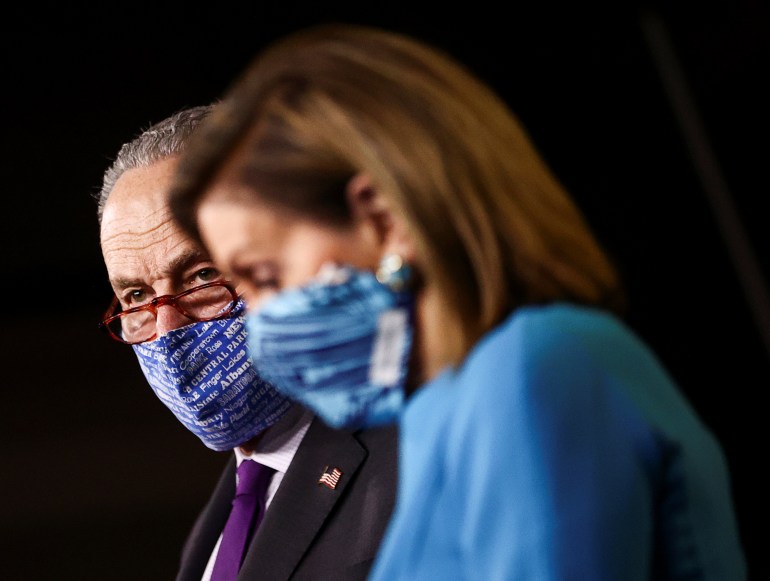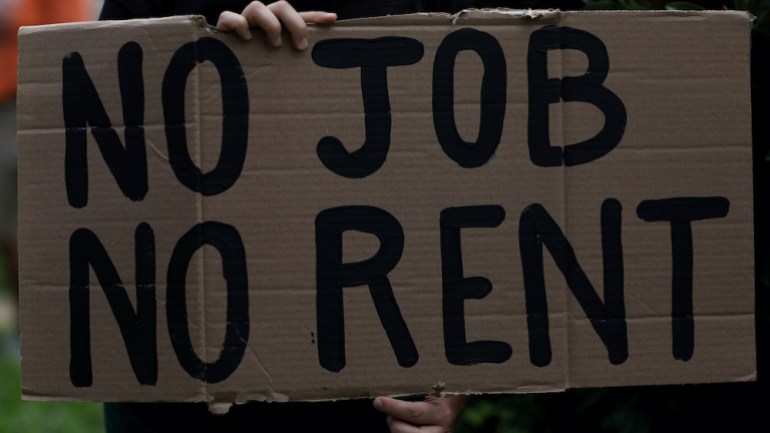US stimulus saga: What could end up in new COVID-19 relief bill?
As politicians continue to argue over the next round of aid, key protections for renters, student loan borrowers and unemployed workers are set to expire in a matter of weeks.

It’s America’s current long-running, political soap opera: when will the next round of United States coronavirus relief aid be approved, and what will the bill actually contain?
Congressional Democrats – and the administration of US President Donald Trump – have been sparring over the subject for months, while millions of struggling American families and small businesses anxiously await much-needed financial aid.
Keep reading
list of 4 itemsEviction looms for struggling US renters as stimulus talks drag
Stimulus saga: Can Americans keep up with credit card bills?
Fed chair, Treasury urge Congress to give US a stimulus ‘bridge’
Many of the provisions from April’s $2.2 trillion Coronavirus Aid, Relief, and Economic Security (CARES) Act expired at the end of July, and others that protect renters, student loan borrowers and the unemployed will expire at the end of December.
So what’s the holdup in approving more aid? Here’s the latest in the ongoing stimulus saga.
Psst, what do we mean by stimulus?
The coronavirus pandemic shuttered businesses, halted travel and threw millions of people out of work, upending economies around the globe, including the US.
Until there is widespread immunity to the virus, it won’t be business as usual for many sectors. That’s where the government comes in. Lawmakers in the US Congress can stimulate the economy with cash in the form of financial lifelines to small businesses, direct-cash payments to households, enhanced unemployment benefits, debt relief and other measures to help people ride out the pandemic.
Put simply: throw money at the problem until things get better.
Money sounds good. So what’s the big debate?
Republicans and Democrats disagree over how much stimulus the US economy needs, what form it should take and how it should be doled out.
Generally speaking, Democrats want a bigger bill that offers supplementary federal unemployment benefits for workers – but it would cost $2.2 trillion.
Republicans want a pared-down version. The latest proposal from Trump’s Treasury Secretary Steven Mnuchin would come with a $916bn price tag.
Both proposals mean spending more when the US government already has a budget deficit of $3.3 trillion and the pandemic isn’t over yet.

Trillions, billions – what would these bills actually do?
Democrats want to extend state jobless benefits and restart the $300 federal weekly top-up for unemployed workers, which expired at the end of July. They also want to provide relief to cash-strapped state and local governments and send out another round of $1,200 stimulus cheques to individuals.
And Trump’s proposal?
Trump’s plan would give individuals $600 stimulus cheques – half of what they received in April – but wouldn’t include the $300 federal top-up on state unemployment benefits.
It offers no aid to state and local governments, which have seen their coffers drained by the crisis. It would also protect businesses, universities and schools from virus-related lawsuits.

Does anyone have any other ideas?
A third group – made up of senators from both parties – is proposing a $908bn solution. Led by Democratic Senator Joe Manchin of West Virginia and GOP Senators Susan Collins of Maine and Lisa Murkowski of Alaska, that group’s proposal includes the $300-per-week pandemic jobless benefit and $160bn for states and local governments but doesn’t send a cheque to every American.
When do they all have to reach an agreement?
Strictly speaking, this should have been sorted out months ago. Or weeks ago. Or right now.
But seriously, the clock is running out. On December 9, the House is set to pass a one-week funding bill to give lawmakers more time to reach an agreement. Without the measure, the US federal government would enter a shutdown less than two weeks before Christmas.
A government shutdown during a pandemic? That doesn’t sound good.
It isn’t. So Washington had better get to work – and fast.
So whose decision is it to make?
That’s the problem – everyone’s. The House of Representatives – where Democrats are in the majority – passes the stimulus bill first.
The bill then moves to the Senate, where Republicans currently hold control. And then it will have to be signed by outgoing President Trump, who has less than two months left in office.
For his part, Democratic President-elect Joe Biden has made it clear he wants as much relief aid as possible – but many struggling businesses and families can’t wait for help until he takes office on January 20.

What’s at stake?
Hanging in the balance are more than 10 million Americans who are unemployed, and the 30 million to 40 million who could face eviction when a moratorium expires at the end of the year, according to the National Low Income Housing Coalition.
Families have been struggling to put food on the table since the pandemic began. Feeding America, the country’s largest hunger-relief organisation, said its network of nationwide food banks has distributed an estimated 4.2 billion meals since March 1.
So while politicians spar, ordinary people are stuck in limbo. The US is already experiencing a surge in COVID-19 infections, and experts warn that mass evictions could help spread the coronavirus. If that weren’t bad enough, a post-holiday default on credit card debt could send financial markets spiralling.
If it’s that serious, why can’t politicians just play nice?
That’s a great question – and maybe one to ask Santa.